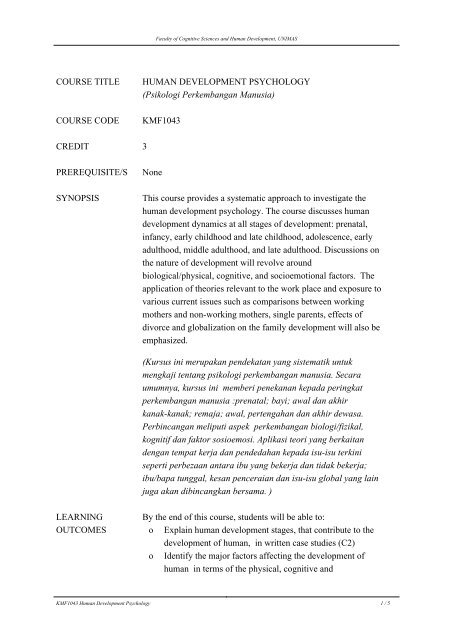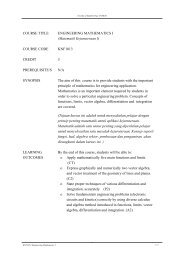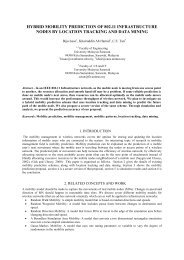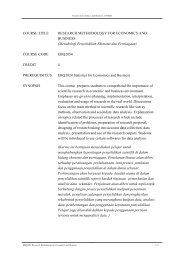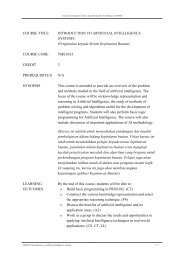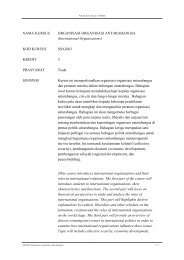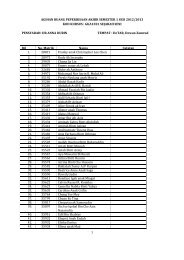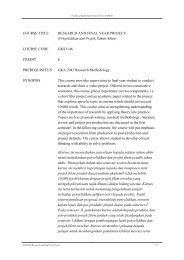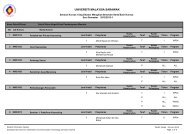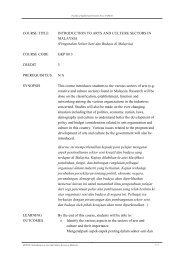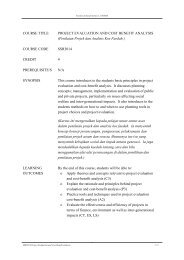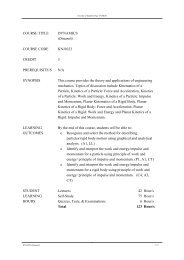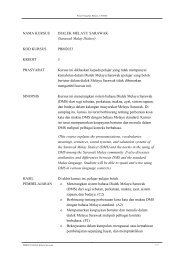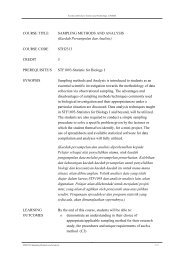COURSE TITLE HUMAN DEVELOPMENT PSYCHOLOGY ...
COURSE TITLE HUMAN DEVELOPMENT PSYCHOLOGY ...
COURSE TITLE HUMAN DEVELOPMENT PSYCHOLOGY ...
Create successful ePaper yourself
Turn your PDF publications into a flip-book with our unique Google optimized e-Paper software.
Faculty of Cognitive Sciences and Human Development, UNIMAS<br />
<strong>COURSE</strong> <strong>TITLE</strong><br />
<strong>COURSE</strong> CODE<br />
<strong>HUMAN</strong> <strong>DEVELOPMENT</strong> <strong>PSYCHOLOGY</strong><br />
(Psikologi Perkembangan Manusia)<br />
KMF1043<br />
CREDIT 3<br />
PREREQUISITE/S<br />
SYNOPSIS<br />
None<br />
This course provides a systematic approach to investigate the<br />
human development psychology. The course discusses human<br />
development dynamics at all stages of development: prenatal,<br />
infancy, early childhood and late childhood, adolescence, early<br />
adulthood, middle adulthood, and late adulthood. Discussions on<br />
the nature of development will revolve around<br />
biological/physical, cognitive, and socioemotional factors. The<br />
application of theories relevant to the work place and exposure to<br />
various current issues such as comparisons between working<br />
mothers and non-working mothers, single parents, effects of<br />
divorce and globalization on the family development will also be<br />
emphasized.<br />
(Kursus ini merupakan pendekatan yang sistematik untuk<br />
mengkaji tentang psikologi perkembangan manusia. Secara<br />
umumnya, kursus ini memberi penekanan kepada peringkat<br />
perkembangan manusia :prenatal; bayi; awal dan akhir<br />
kanak-kanak; remaja; awal, pertengahan dan akhir dewasa.<br />
Perbincangan meliputi aspek perkembangan biologi/fizikal,<br />
kognitif dan faktor sosioemosi. Aplikasi teori yang berkaitan<br />
dengan tempat kerja dan pendedahan kepada isu-isu terkini<br />
seperti perbezaan antara ibu yang bekerja dan tidak bekerja;<br />
ibu/bapa tunggal, kesan penceraian dan isu-isu global yang lain<br />
juga akan dibincangkan bersama. )<br />
LEARNING<br />
OUTCOMES<br />
By the end of this course, students will be able to:<br />
o Explain human development stages, that contribute to the<br />
development of human, in written case studies (C2)<br />
o Identify the major factors affecting the development of<br />
human in terms of the physical, cognitive and<br />
KMF1043 Human Development Psychology 1 / 5
Faculty of Cognitive Sciences and Human Development, UNIMAS<br />
o<br />
socioemotional, in written case studies (P1, CT)<br />
Discuss the issues involving human development, in a<br />
project paper (A2, TS)<br />
STUDENT<br />
LEARNING<br />
HOURS<br />
Lectures<br />
Tutorials<br />
Student-Centered Learning<br />
Self-Study<br />
Quizzes, Tests, & Examinations<br />
Total<br />
28 Hour/s<br />
8 Hour/s<br />
6 Hour/s<br />
73 Hour/s<br />
5 Hour/s<br />
120 Hour/s<br />
LEARNING<br />
UNITS<br />
Supervised<br />
Learning Hours<br />
1. The Study of Human Development, Theory and<br />
Research<br />
- Basic Concepts<br />
- Influences of Development<br />
- Basic Theoretical Issues<br />
- Theoretical Perspectives<br />
- Research Methods<br />
6<br />
2. The Beginnings (0-3 years)<br />
- Conceiving Process<br />
- Heredity, Nature vs Nurture<br />
- Prenatal Development<br />
- Promoting Natal Development<br />
- Birth Process and Stages<br />
- Newborn<br />
- Early Physical Development<br />
- Motor Development<br />
- 6 Cognitive Development Approaches<br />
- Behaviorist Approach<br />
- Psychometric Approach<br />
- Piagetian Approach<br />
- Information Processing<br />
- Cognitive Neuroscience Approach<br />
- Social Contextual Approach<br />
- Language Development<br />
- Foundations of Psychosocial Development<br />
- Developmental Issues in Infancy<br />
6<br />
KMF1043 Human Development Psychology 2 / 5
Faculty of Cognitive Sciences and Human Development, UNIMAS<br />
- Developmental Issues in Toddlerhood<br />
- Contact with Other Children, Working Parents<br />
- Maltreatment<br />
3. Early Childhood<br />
- Aspects of Physical Development<br />
- Health and Safety<br />
- Piagetian Approach<br />
- Information Processing Development<br />
- Intelligence<br />
- Language Development<br />
- Early Childhood Education<br />
- Development of Self<br />
- Gender Identity<br />
- The Influence of Play<br />
- The Influence of Parenting<br />
- The Influence of Interactions with Other Children<br />
3<br />
4. Middle Childhood<br />
- Aspects of Physical Development<br />
- Health and Safety<br />
- Piagetian Approach<br />
- Information Processing Development<br />
- Intelligence<br />
- Language Development<br />
- School<br />
- Children with Special Needs<br />
- Child and Family<br />
- Child and Peer Group<br />
- Mental Health<br />
3<br />
5. Adolescence<br />
- The Developmental Transition<br />
- Puberty<br />
- Brain<br />
- Physical and Mental Health<br />
- Cognitive Maturation<br />
- Educational and Vocational Issues<br />
- Identity Search<br />
- Sexuality<br />
- Relationship with Family, Peers, and Adult Society<br />
6<br />
KMF1043 Human Development Psychology 3 / 5
Faculty of Cognitive Sciences and Human Development, UNIMAS<br />
- Antisocial Behavior and Juvenile Delinquency<br />
6. Young Adulthood<br />
- Health and Fitness<br />
- Sexual and Reproductive Issues<br />
- Adult Cognition<br />
- Moral Reasoning<br />
- Education and Work<br />
- Development Patterns & Tasks<br />
- Personality Development<br />
- Intimate Relationships<br />
- Marital and Non-marital Lifestyles<br />
- Parenthood<br />
- Divorce<br />
3<br />
7. Middle Adulthood<br />
- Physical Changes<br />
- Physical and Mental Health<br />
- Cognitive Abilities & Adult Cognition<br />
- Creativity<br />
- Work and Education<br />
- The Life Course: Looking Back<br />
- Psychosocial Changes<br />
- Relationships at Midlife<br />
- Consensual Relationships<br />
- Relationships with Maturing Children<br />
- Other Kinship Ties<br />
6<br />
8. Late Adulthood<br />
- Longevity and Aging<br />
- Physical Changes<br />
- Physical and Mental Health<br />
- Intelligence<br />
- Cognitive Processing<br />
- Memory Changes<br />
- Wisdom<br />
3<br />
9. Late Adulthood<br />
- Personality Development<br />
- Well-being<br />
- Practical and Social Issues<br />
3<br />
KMF1043 Human Development Psychology 4 / 5
Faculty of Cognitive Sciences and Human Development, UNIMAS<br />
- Personal Relationships<br />
- Marital<br />
- Non-Marital Relationships and Kinship Ties<br />
10. The End of Life<br />
- Meaning of Death and Bereavement<br />
- Facing Death and Loss<br />
- Significant Losses<br />
- Medical, Legal, and Ethical Issues<br />
- Finding Meaning and Purpose in Life and Death<br />
3<br />
ASSESSMENT Group Assignment 1 (case study)<br />
15 %<br />
Group Assignment 2 (case study)<br />
15 %<br />
Group Assignment 3 (project paper)<br />
20 %<br />
Mid-term Examination<br />
20 %<br />
Final Examination<br />
30 %<br />
Total<br />
100 %<br />
REFERENCES 1. Crandell, T., Crandell, C., & Zanden, J. V. (2008). Human<br />
development (9th ed.). New York: McGrawHill.<br />
2. Freiberg, K. (2009). Annual editions: Human development<br />
09/10. New York: McGrawHill.<br />
3. Kail, R. V., & Cavanaugh, J. C. (2008). Human<br />
development: A life span view (5th ed.). Wadsworth: USA.<br />
4. Papalia, D. E., Olds, S. W., & Feldman, R. D. (2006).<br />
Human development (9th ed.). New York: McGrawHill.<br />
5. Papalia, D. E., & Olds, S. W. (2009). Human development.<br />
New York: McGrawHill.<br />
Last updated: May 2, 2011, Mon, 3:41 PM<br />
KMF1043 Human Development Psychology 5 / 5


